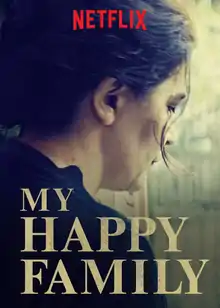My Happy Family
My Happy Family (Georgian ჩემი ბედნიერი ოჯახი) is a 2017 Georgian drama film directed by Nana Ekvtimishvili and Simon Groß. It was screened in the World Cinema Dramatic Competition section of the 2017 Sundance Film Festival.[2] The film had its world premiere in the Forum section at the 67th Berlin International Film Festival.[3] Both Nana Ekvtimishvili and Simon Groß were awarded Best Director at the Sofia International Film Festival, where their film was entered in the International Competition section.[4]
| My Happy Family | |
|---|---|
 Film poster | |
| Directed by | Nana Ekvtimishvili Simon Groß |
| Written by | Nana Ekvtimishvili |
| Starring | Ia Shugliashvili |
| Cinematography | Tudor Vladimir Panduru |
| Edited by | Stefan Stabenow |
| Distributed by | Memento Film |
Release date |
|
Running time | 120 minutes |
| Country | Georgia |
| Language | Georgian |
| Box office | $428,468[1] |
Plot
Manana (Ia Shughliashvili), a 50-year-old woman, decides to leave her family, husband, children, and parents. The reasons and rationale for her decision are initially and largely unknown to her family, and seem to remain a mystery to them throughout the entire story. Her perspective, however, is slowly disclosed to the audience. Manana’s decision to challenge the religious expectations of women in her community gives “My Happy Family” an enlightened feminist streak, owing much to its central performance.
Manana, a school teacher with a career and income of her own, rents a small flat on the outskirts of town. At a local market, and quite by coincidence, she runs into a former high school classmate who invites Manana to attend their 35th high school reunion. Attending the reunion and visiting with her former friends, a devastating secret is revealed. Her husband, Soso, had an affair while married to Manana and fathered a boy, who is now 13 years old. Weeks later, posing as a meter-reader for the gas company, Manana visits this woman and her son as a way to see them both in person. While living in her flat, Manana also discovers her brother Rezo has spoken to her new neighbors about her life, her decisions, and her situation, and while her brother seems to believe his actions are an attempt to "defend" his sister from strange men, Manana views his actions as an intrusive violation of her privacy, dignity, and personal agency.
Meanwhile, Manana's own son who still lives with Manana's parents and his father brings his pregnant girlfriend to the family home to announce his surprise marriage. Manana's daughter is heartbroken to learn her new husband is having an affair (which Manana had accidentally discovered, but had not disclosed). The film ends as Manana poses several important questions to her husband Soso, and the audience is left to wonder what his responses might have been.
Cast
- Ia Shugliashvili as Manana
- Merab Ninidze as Soso
- Berta Khapava as Lamara
- Tsisia Qumsishvili as Nino
- Dimitri Oragvelidze as Rezo
- Giorgi Khurtsilava as Vakho
- Giorgi Tabidze as Lasha
- Goven Cheishvili as Otar
- Lika Babluani as Tatia Chigogidze
- Mariam Bokeria as Kitsi
Critical reception
After the Sundance Film Festival, the film was screened in Berlinale forum to positive reviews. On review aggregator Rotten Tomatoes, the film holds an approval rating of 100% based on 16 reviews, with an average rating of 8.3/10.[5] On Metacritic, the film has a score of 86 out of 100 from 10 critics, indicating "universal acclaim".[6]
Eric Kohn of Indiewire writes, "My Happy Family was shot by Romanian cinematographer Tudor Vladimir Panduru, and recalls many of the strengths found in recent Romanian cinema, which often peers into the hectic personal dramas of characters who are smothered by social expectations. The story is laced with lovely melodies and traditional songs that play off Manana’s internal desperation; the camera roams freely around her in crowded scenes that show just how much the groupthink alienates her from her own needs."[7] In The Hollywood Reporter, Jordan Mintzer states that the film is "a simple, somewhat mundane scenario that, in the hands of a terrific cast and two talented filmmakers, is transformed into a minor Greek comic-tragedy, with one fearless woman trying to stave off loved ones who smother her with guilt and affection."[8] Village Voice critic Bilge Ebiri said the film was "one of the best films of the year."[9]
References
- "My Happy Family (Une famille heureuse)". Box Office Mojo. Retrieved 17 August 2017.
- Erbland, Kate (30 November 2016). "Sundance 2017 Announces Competition and NEXT Lineups, Including Returning Favorites and Major Contenders". IndieWire. Retrieved 21 January 2017.
- "- Berlinale - Press - Press Releases - Forum - Forum 2017: Realistic and Surreal". Retrieved 20 March 2017.
- "Awards". Retrieved 20 March 2017.
- "My Happy Family (Chemi Bednieri Ojakhi) (2017)". Retrieved 12 March 2018.
- "My Happy Family Reviews". Retrieved 15 February 2018.
- Kohn, Eric. "'A Happy Family' Review: Georgian Drama From 'In Bloom' Directors - IndieWire". www.indiewire.com. Retrieved 4 October 2017.
- "'My Happy Family' ('Chemi Bednieri Ojakhi'): Film Review - Sundance 2017". Retrieved 4 October 2017.
- "Sundance: Seriously, We Already Have One of 2017's Best Films - Village Voice". Retrieved 4 October 2017.